
Network is a 1976 American satirical black comedy-drama film written by Paddy Chayefsky and directed by Sidney Lumet, about a fictional television network, UBS, and its struggle with poor ratings. The film stars Faye Dunaway, William Holden, Peter Finch and Robert Duvall and features Wesley Addy, Ned Beatty and Beatrice Straight.

I Never Sang for My Father is a 1970 American drama film, based on the 1968 play of the same name. It tells the story of a widowed college professor who feels dominated by his aging father, yet still has regrets about his plan to leave him behind when he remarries and moves to California. It stars Melvyn Douglas, Gene Hackman, Dorothy Stickney, Estelle Parsons, and Elizabeth Hubbard.

The Hurricane is a 1999 American biographical sports drama film directed and produced by Norman Jewison. The film stars Denzel Washington as Rubin "The Hurricane" Carter, a former middleweight boxer who was wrongly convicted for a triple murder in a bar in Paterson, New Jersey. The script was adapted by Armyan Bernstein and Dan Gordon from Carter's 1974 autobiography The Sixteenth Round: From Number 1 Contender To 45472 and the 1991 non-fiction work Lazarus and the Hurricane: The Freeing of Rubin "The Hurricane" Carter by Sam Chaiton and Terry Swinton.

The Morning After is a 1986 American neo noir mystery thriller film directed by Sidney Lumet and starring Jane Fonda, Jeff Bridges and Raul Julia. The film received generally favorable reviews and was a moderate commercial success, grossing $25.1 million against its $15 million budget. Fonda received a nomination for the Academy Award for Best Actress.

American Gigolo is a 1980 American neo-noir crime drama film written and directed by Paul Schrader and starring Richard Gere and Lauren Hutton. It tells the story about a high-priced escort in Los Angeles (Gere) who becomes romantically involved with a prominent politician's wife (Hutton), while simultaneously becoming the prime suspect in a murder case.
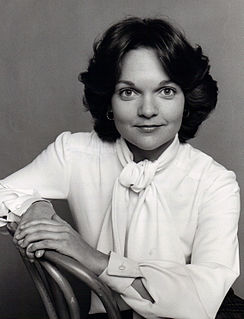
Pamela Reed is an American actress. She is known for playing Arnold Schwarzenegger's hypoglycemic police partner in the 1990 movie Kindergarten Cop and as the matriarch Gail Green in Jericho. She appeared as Marlene Griggs-Knope on the NBC sitcom Parks and Recreation. She is also well known as the exasperated wife in Bean.

Agatha is a 1979 British drama thriller film directed by Michael Apted and starring Vanessa Redgrave, Dustin Hoffman, and Timothy Dalton. It was written by Kathleen Tynan. The film focuses on renowned crime writer Agatha Christie's famous 11-day disappearance in 1926. The film was released on 9 February 1979, receiving generally positive reviews from critics, who praised the production values and performances.

Two of a Kind is a 1983 American romantic fantasy crime comedy-drama film directed by John Herzfeld and starring John Travolta and Olivia Newton-John. The film reunited Travolta and Newton-John who had appeared together in 1978's Grease. The original musical score was composed by Patrick Williams. Travolta plays a cash-strapped inventor while Newton-John plays the bank teller whom he attempts to rob. They must come to show compassion for one another in order to delay God's judgment upon the Earth. Despite being a critical failure, the film's soundtrack was a commercial success, yielding three hit singles for Newton-John and being certified Platinum.
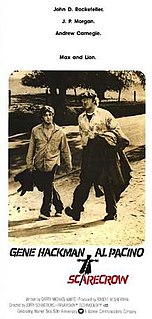
Scarecrow is a 1973 American road movie directed by Jerry Schatzberg, and starring Gene Hackman and Al Pacino. The story revolves around the relationship between two men who travel from California, aiming to start a business in Pittsburgh.

French Connection II is a 1975 American action thriller film starring Gene Hackman and directed by John Frankenheimer. It is a sequel to the 1971 Academy Award for Best Picture winner The French Connection. The film continues the story of the central character, Detective Jimmy "Popeye" Doyle, again played by Gene Hackman who won the Academy Award for Best Actor for the first film. In the film, Doyle travels to Marseille, France, where he is attempting to track down French drug-dealer Alain Charnier, played by Fernando Rey, who escaped at the end of the first film. Hackman and Rey are the only returning cast members.
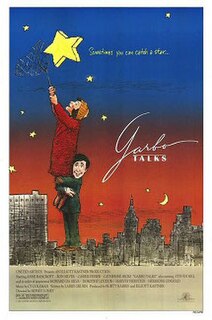
Garbo Talks is a 1984 American comedy-drama film directed by Sidney Lumet and starring Anne Bancroft, Ron Silver, and Carrie Fisher, with a cameo appearance by Betty Comden as Greta Garbo.

Bite the Bullet is a 1975 American Western film written, produced, and directed by Richard Brooks and starring Gene Hackman, Candice Bergen, and James Coburn, with Ian Bannen, Jan-Michael Vincent, Ben Johnson, and Dabney Coleman in supporting roles.

Murder on the Orient Express is a 1974 British mystery film directed by Sidney Lumet, produced by John Brabourne and Richard Goodwin, and based on the 1934 novel of the same name by Agatha Christie.
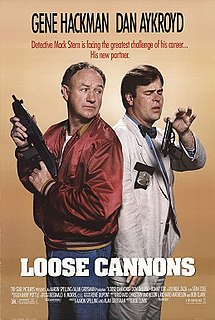
Loose Cannons is a 1990 American action comedy film, written by Richard Matheson, Richard Christian Matheson and Bob Clark, who also directed the film. The film stars Gene Hackman as a hard-nosed cop who is teamed up with a detective with multiple-personality disorder, played by Dan Aykroyd, to uncover a long-lost Nazi sex tape, featuring Adolf Hitler, which would jeopardize the political future of the German chancellor-elect. The theme song features vocals by Katey Sagal and Aykroyd.
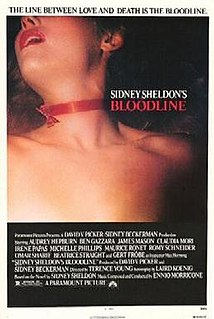
Bloodline is a 1979 thriller film directed by Terence Young from a screenplay by Laird Koenig, based on the 1977 novel of the same name by Sidney Sheldon. It was the only R-rated film ever made by its star, Audrey Hepburn.
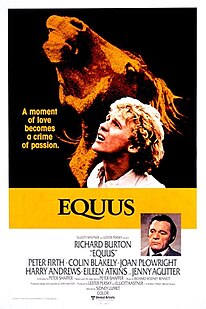
Equus is a 1977 psychological drama film directed by Sidney Lumet and written by Peter Shaffer, based on his play of the same name. The film stars Richard Burton, Peter Firth, Colin Blakely, Joan Plowright, Eileen Atkins, and Jenny Agutter. The story concerns a psychiatrist treating a teenager who has blinded horses in a stable, attempting to find the root of his horse worship.
Dick Richards is an American film director, producer, and screenwriter. Known as a storyteller and an “actor’s director”, Richards worked with Robert Mitchum, Gene Hackman, Martin Sheen, Blythe Danner, Catherine Deneuve, Alan Arkin and many others.

Child's Play is a 1972 American drama-mystery film directed by Sidney Lumet. It stars James Mason, Robert Preston and Beau Bridges. The screenplay by Leon Prochnik is based on the 1970 play of the same title by Robert Marasco.

Echo Park is a 1986 American comedy-drama film set in the Echo Park neighborhood of Los Angeles, California. The plot follows several aspiring actors, musicians and models. The cast includes Tom Hulce, Susan Dey, Cheech Marin and Michael Bowen. Cassandra Peterson, better known as Elvira, has a brief cameo as a secretary. Echo Park was the final film of veteran actor Timothy Carey.

Denzel Washington is an American actor who made his feature film debut in Carbon Copy (1981). In 1982, Washington made his first appearance in the medical drama St. Elsewhere as Dr. Philip Chandler. The role proved to be the breakthrough in his career. He starred as Private First Class Melvin Peterson in the drama A Soldier's Story (1984). The film was an adaptation of the Off-Broadway play A Soldier's Play (1981–1983) in which Washington had earlier portrayed the same character. In 1987, he played Steve Biko, an anti-apartheid activist in the Richard Attenborough-directed drama Cry Freedom, for which he received his first nomination for the Academy Award for Best Supporting Actor. Two years later, Washington won the award for playing Trip, a former slave-turned-soldier in Civil War film Glory (1989). In 1990, he played the title character in the play The Tragedy of Richard III, and starred in Spike Lee's comedy-drama Mo' Better Blues. Washington received the Silver Bear for Best Actor at the Berlin International Film Festival, for playing the eponymous civil rights activist in Lee's Malcolm X (1992).



















